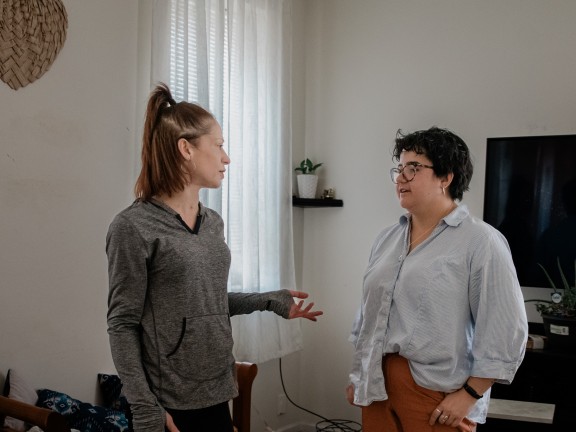Trauma Informed Care

Understanding trauma and its impact on our participants is a vital component of competent service provision. In this session, presenters will assist attendees with defining trauma, identifying common sources of trauma, and exploring the need for trauma-informed services. Presenters will introduce the key components of trauma-informed care, highlight the role of intersectionality, and discuss strategies for effectively responding to and countering the adverse experiences of program participants with co-occurring disorders experiencing chronic homelessness.
Schedule
12:45-1:00 PM | Virtual training room opens
1:00-1:10 PM | Welcome, introductions, & check-in activity
1:10-1:40 PM | Defining trauma, common sources of trauma, ACE study
1:40-2:00 PM | A trauma-informed approach to services
2:00-2:20 PM | The 5 R’s of trauma-informed care
2:20-2:25 PM | Break
2:25-3:00 PM | 6 key principles of trauma-informed care
3:00-3:15 PM | Vicarious trauma & self-care
3:15-3:30 PM | Review, Q&A
Learning objectives
When attendees return to the workplace, they will be able to:
- Define trauma and identify common sources of trauma
- Recognize and explain the five R’s of Trauma-Informed Care
- Describe the key components of Trauma-Informed Care
Target Audience: Social service providers and helping professionals with direct client contact.
Social Work Practice Level: This course is appropriate for beginner and intermediate BSW/MSW learners.
Course Delivery Format: Live webinar
Interactivity: This course will offer real-time polling, group discussion prompts, and 15 minutes of Q&A time.
Social Work Continuing Education Credit: 2.25 CE Credits*
Fees: $20 general registration; additional $5 for registration with social work CE credit
Registration includes access to the live event and recording, PDF of slides, and relevant training tip sheets/resources.
Session Facilitators:
Ryan Villagran, MSW, LSW (they/them), joined Housing First University in June 2021 as a Training Specialist. Ryan holds a Master of Social Work from Temple University with a concentration in Communities & Policy. Their clinical background includes delivering psychiatric rehabilitation services in the mental health recovery model at a Community Integrated Recovery Center. Ryan also developed and coordinated a training program in a university setting for social workers serving transitional-aged youth and later taught a Human Behavior in the Social Environment course for graduate social work students. Ryan believes in the power of our collective imagination to dream of a better future centered around those on the margins.
Khalil Martin, MSW, LSW (he/him) joined Pathways to Housing PA in 2021 and served in a clinical leadership role on an ACT team for individuals with Opioid Use Disorder before joining Housing First University as a Training Specialist in January 2023. Prior to this, Khalil worked as a Behavioral Health Therapist at runaway & homeless youth shelters throughout the tri-state area, as well as with Project HOME, where he assisted in the creation of the Gloria Casarez Residence– the first permanent supportive housing for LGBTQ+ young adults in Pennsylvania. Drawing from principles of feminist theory, Khalil uses a strength-based and person-centered approach to assist individuals in understanding and navigating various forms of oppression and how these systems impact one's personal and interpersonal experiences. Khalil received his Master’s degree in clinical social work from The University of Pennsylvania.
ACE approval statement: Housing First University: a program of Pathways to Housing PA, provider #1759, is approved as an ACE provider to offer social work continuing education by the Association of Social Work Boards (ASWB) Approved Continuing Education (ACE) program. Regulatory boards are the final authority on courses accepted for continuing education credit. ACE provider approval period: 01/12/2022 - 01/12/2025. Social workers completing this course receive 2.25 clinical continuing education credits.
*Housing First University, a program of Pathways to Housing PA, can provide continuing education credits to licensed social workers in 48 of the 50 U.S. states and 10 Canadian provinces. Due to current regulations, CE credits cannot be offered to social workers in the states of New Jersey or New York. If you are not a Licensed Social Worker, please check with your board of accreditation to ensure this training meets your licensing needs.
To request an accessibility accommodation, please email: training@pthpa.org
For questions or comments, please contact:
Andrew Spiers, LSW
Continuing Education Director
Housing First University, a program of Pathways to Housing PA
aspiers@pthpa.org (215) 390-1500, ext. 1708